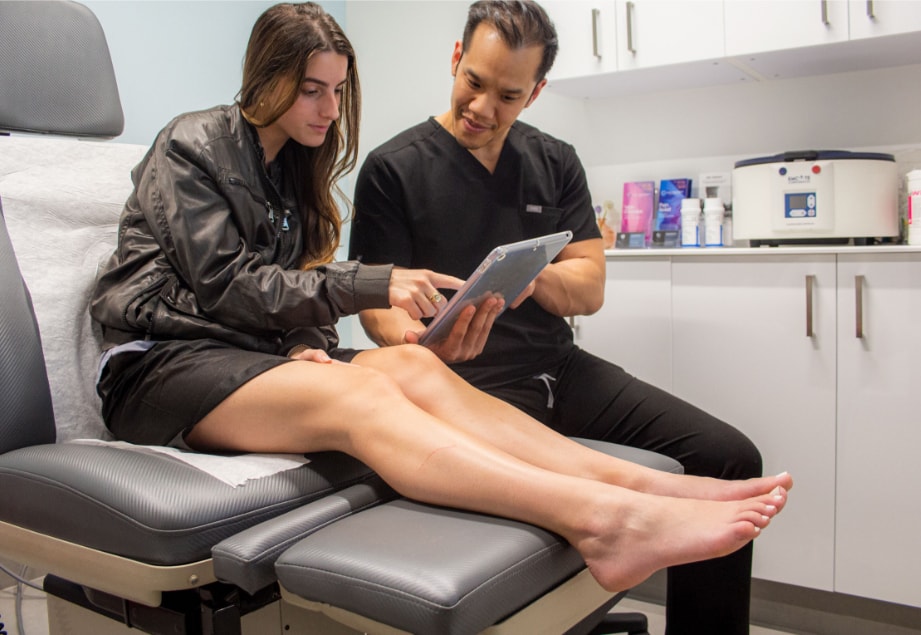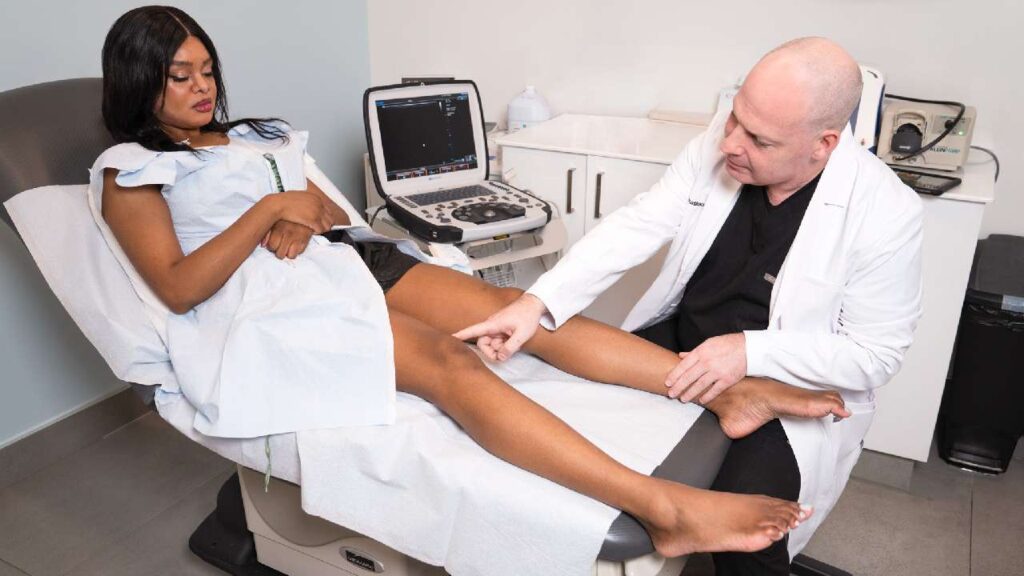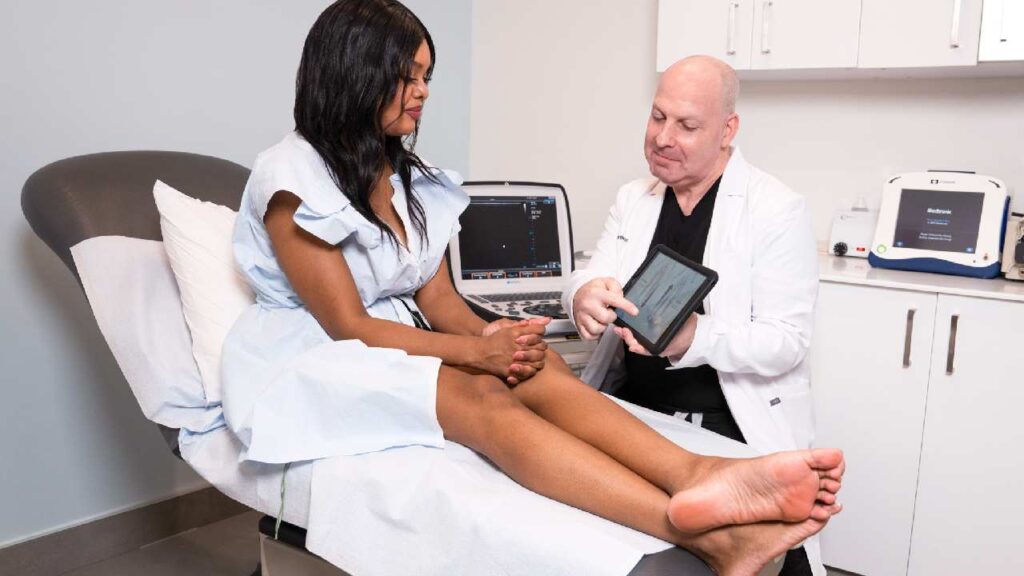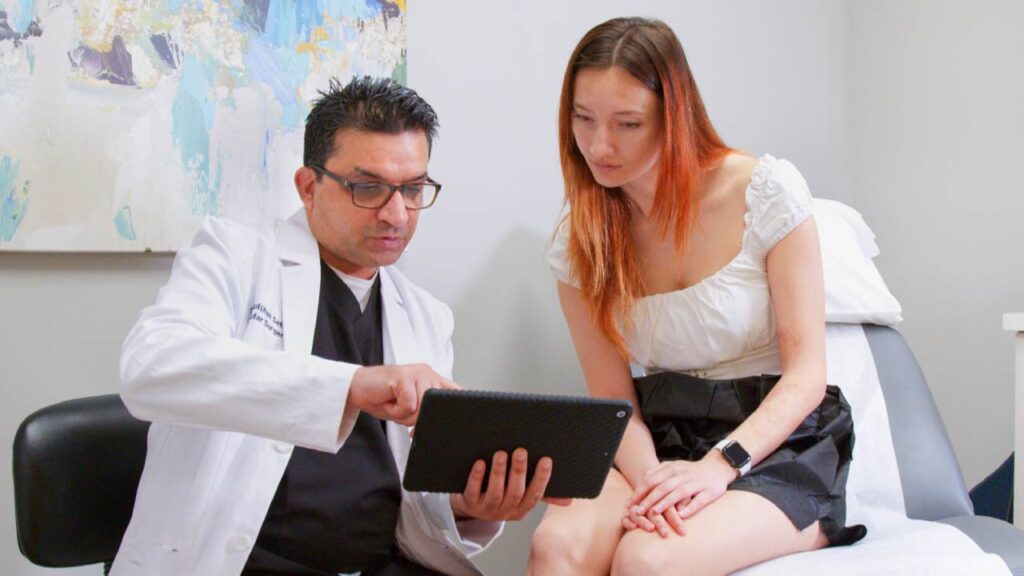What Is a Vein and Vascular Specialist Called?
There are three primary types of doctors who specialize in veins: vascular surgeons, phlebologists, and vein specialists. Always inquire about a vein specialist’s training, since the term “specialist” isn’t regulated. Book an appointment with board certified, Harvard-trained vein doctors in New York who provide a full range of vein treatments. Read on to learn about different specialties.
- Phlebologists: Phlebologists are trained in minimally invasive treatments for spider veins, varicose veins, and vein disease. They’ve passed a written examination and are experienced in newer methods to treat veins. These include sclerotherapy, radiofrequency ablation, endovenous laser ablation, mechanochemical ablation, and vein adhesives. They’re often board certified by the American Board of Venous and Lymphatic Medicine (ABVLM board certified), but this is a separate process from becoming a phlebologist.
- Vein specialists: Vein specialists with medical degrees have studied vein medicine, often in addition to complementary specialties. For instance, board certified pain doctors, internal medicine doctors, and anesthesiologists are often double or triple certified, with one certification being vascular medicine. These doctors provide non-surgical vein treatment, like phlebologists. But they often have a broader medical background, with either ABVLM or ABMS board certification. Vein specialists and phlebologists are the best choice for spider veins and varicose veins, since these rarely require surgery.
- Vascular surgeons: Vascular surgeons complete four years of medical school, followed by five to seven years in a surgical residency program, and often two years in vascular fellowships. These doctors might be board certified by the American Board of Medical Specialties (ABMS board certified), but that’s a separate distinction. They’re trained in surgical procedures for blood vessels like veins and arteries, except those inside the heart and lungs. If you have spider veins or varicose veins, don’t choose a vascular surgeon unless that surgeon also treats veins with minimally invasive methods.

What Is the Phlebology Definition?
Phlebology is a medical specialty involving the treatment of vein issues and diseases. Phlebologists perform non-surgical vein procedures to close off spider veins and varicose veins. These include sclerotherapy, endovenous laser treatments, mechanochemical ablation, radiofrequency ablation, and surface laser treatments. Some brand names for these procedures include Asclera, Varithena, VNUS Closure, ClariVein, VenaSeal, ClosureFast, and VEINIO. These methods are the first choice for most varicose veins and spider veins.
What Is a Varicose Vein Doctor Called?
For varicose veins, choose a board certified, minimally invasive vein specialist. They avoid surgery whenever possible, but they offer treatments that aren’t just cosmetic. Many of them conduct ultrasound-guided procedures, which allow them to find and treat the source of the vein, not just the vein itself.
Finding the source is essential with varicose veins, since they often stem from valve failure in deeper veins. Until you treat that, you’re likely to develop additional vein damage, as well as symptoms like heaviness, swelling, cramping, and restlessness in your legs. Rarely, a patient requires surgery for varicose veins, so visit our team of top vein doctors in New York who offer a full range of treatments.
What Is a Spider Vein Dr. Called?
For spider veins, visit a phlebologist or minimally invasive vein specialist. Spider veins never require surgery. They’re easily treated with injections or thermal treatments. You need a vein specialist for spider veins, not a cosmetic vein clinic. Spider veins can also stem from valve failure in deeper veins, just like varicose veins. A vein doctor can check for underlying vein disease, so you don’t have a continual proliferation of spider veins.
Is a Vascular Surgeon Doctor Right for Me?
Vascular surgeons used to routinely treat varicose veins. But less invasive methods have made surgery a last resort for veins. Vascular surgeons treat arterial issues like aneurysms and carotid and peripheral artery diseases. But they don’t perform surgery on veins with the same frequency as they once did. Patients with blood clots, severe tortuosity, or certain diseases might require vein surgery. But most patients don’t. Look for a surgeon who also completed minimally invasive training to avoid unnecessary surgery.
Who Are the Best Varicose Vein Surgeons Near Me in New York?
Dr. Juan Montoya is the best choice for varicose vein surgery in New York. An experienced surgeon, he is also a top minimally invasive vein specialist. He’ll conduct a thorough examination to determine whether you need surgery. With his vast knowledge, he solves vein issues with the least invasive method possible. If you’re wondering, “What is a doctor who specializes in veins called,” book a consultation with our team. Our vascular doctors are certified in diverse vascular fields, providing comprehensive care.
Who Are the Top Vein Doctors Near Me in NY for Spider Veins?
For spider veins, Dr. Montoya is an excellent choice, along with Dr. Michael Nguyen, Dr. Sareh Rajaee, and Dr. Andrew Cortes. Our vein experts are board certified pioneers in minimally invasive vein medicine. Each of these physicians graduated at the top of their class and is renowned for cutting-edge vein care.
What Is the Best Vein Clinic Near Me in NY for Vein Disease?
If you have vein disease, it’s essential to choose a vein clinic in New York over a cosmetic clinic. Vein diseases like Chronic Venous Insufficiency (CVI) can’t be treated with surface treatments. They require an endovenous approach with ultrasound guidance. Endovenous treatments are quick, painless, and non-surgical, so they’re as easy as surface treatments, but they work for deeper veins.
Many patients don’t know they have vein disease; it’s frequently undiagnosed. If you have spider veins, varicose veins, or leg fatigue, cramping, swelling, restlessness, or itching, you likely have vein disease. Other symptoms include venous ulcerations, venous stasis dermatitis, and bleeding that’s tough to control. Book an appointment at our vein clinic in Midtown or the Financial District for quick diagnosis and treatment.
Who’s the Best Vein Doctor for Varicose Veins in Neck?
Varicose veins can develop anywhere, but they’re common in the lower extremities since leg veins are prone to valve failure. When a vein valve fails, blood flows in reverse, elevating pressure that generates spider veins and varicose veins. If you have a bulging vein in your neck, it might be varicose, or it might just be enlarged. The skin on the neck is thinner and often has less fat beneath it than the skin on the legs. So, it’s easier to see an enlarged vein in your neck than in your thigh.
If you exercise, take a hot shower, or sit in the sun, veins become enlarged. This is normal. Veins stretch when blood pressure is elevated. These veins should shrink when blood pressure lowers. However, if the vein is twisted, symptomatic, or more protuberant than other veins, it might be varicose. Look for a “vascular doctor near me” who can use ultrasound technology to determine whether your vein is varicose or enlarged.
Do Mild Varicose Veins Need a Specialist or Vascular Clinic?
Do you need a vein specialist or vascular clinic for mild varicose veins or spider veins? The short answer is yes. Most vein damage stems from CVI, particularly when it develops in the legs. The diagnosis and treatment of CVI is critical to preventing additional vein damage and symptoms. In addition, some patients have an undiagnosed blood clot that’s inhibiting their circulation.
See a minimally invasive vein specialist who can assess your vascular health and who won’t perform unnecessary treatments. Our renowned vein specialists accept all major insurance plans, including Medicare, so most patients have their veins analyzed, and even treated, for free.





